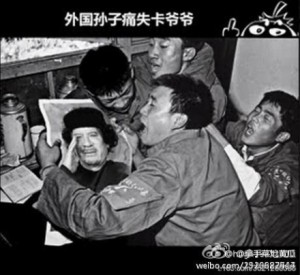
Mourning an old friend. Photoshopped image from the time of Mao’s death.
The Word of the Week comes from China Digital Space’s Grass-Mud Horse Lexicon, a glossary of terms created by Chinese netizens and frequently encountered in online political discussions. These are the words of China’s online “resistance discourse,” used to mock and subvert the official language around censorship and political correctness.
中国人民的老朋友 (Zhōngguó rénmín de lǎo péngyou): old friends of the Chinese people
In official parlance, these are world leaders who have visited China and shown their support for the country. The “friends” most discussed by netizens include Muammar Qaddafi, Mahmoud Ahmadinejad, and Bashar al-Assad. In the early days of the People’s Republic of China, the honorary description was first bestowed to Canadian James G. Endicott in 1956, for his support of the revolution. Early on, “old friends of the Chinese people” were ideological supporters, but as China’s foreign policy has become more pragmatic and economics-driven, the phrase has been used to describe trade partners and leaders of international organizations.
The description of late Cambodian ex-king Norodom Sihanouk as an old friend of the Chinese people in state-run media provoked netizen ire, as many felt he did not deserve the outpouring of official condolences. The main point of their concern was that the government lowered flags to half-mast for the foreign political figure, while failing to make any similar demonstrations of sympathy for the many Chinese who had died in natural disasters and accidents during that time period.
Despite the phrase “old friend of the Chinese people” being most commonly used to describe dictators, Xi Jinping previously used the phrase to describe the departing U.S. ambassador to China, Jon Huntsman.
China also occasionally describes its relations with other countries in terms of friendships, referring to Pakistan as an “all-weather friend”.







